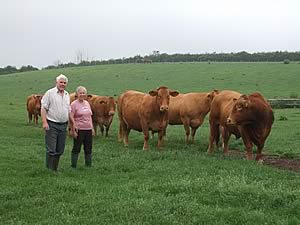2009-08-03
The Ridgemere herd owned by David and Barbara Bowley, of Earl Shilton, Leicestershire, has been recognised by EBLEX as the Most Improved Herd for the South Devon breed for 2008/09.
David and Barbara Bowley and the Ridgemere herd of
South Devon cattle.
 |
The award is presented by the EBLEX Beef Better Returns Programme (Beef BRP), to the recorded herd that shows the greatest genetic gain for commercial traits over a 12-month period. There is a separate award for each of ten UK breeds.
Westfield Farm has been in David Bowley’s family since 1943. After his brother and sister retired, the dairy cows, pasteurizer, bottling unit and milk round were sold and the farm was split, leaving David and Barbara with 45ha (110 acres). Half is managed by contractors to grow cereals, the rest is grassland for the South Devon herd, and 100 commercial cattle which are bought in to finish.
The Bowleys established the pedigree herd in 2006 by buying eight bulling heifers from the Stratford Midlands Sale. Since then, their numbers have increased with the purchase of more heifers and the retention of home-bred females.
All bull calves are left entire. Those that do not make the grade for breeding in terms of type and performance are reared for bull beef.
Calving takes place indoors during the spring, with the stock turned out as soon as possible. The calves are offered ad-lib creep feed and left on the cows all summer. They are weaned at housing in November and fed a straw-based diet, with a little silage and 1kg of 16% crude protein feed, depending on their condition.
An easy calving Limousin bull is used on the heifers for their first breeding, to produce good-sized progeny that can be sold as quality stores at 14-15 months. For subsequent servings, the majority of the females are served by AI, with semen from the best pedigree bulls, mainly from performance recorded herds.
“Our key objective is to build a small herd of 40 high quality animals,” explains
Mr Bowley. “I want to improve the herd through careful breeding and by purchasing the best stock I can. To do this I need to use tools such as Estimated Breeding Values (EBVs) to make sure I select the right type of animal for our herd.”
The majority of mating is done through the SAS breeding group of eight South Devon breeders. Using the best two bulls available – Trevowah Joe Louis 11 and Highgate Hayden 11 – Mr Bowley matches the EBVs of the bulls to each of his females for best fit. Four sons of Joe Louis are now available for AI, which suggests Mr Bowley’s selection process is already producing some very good results.
Mr Bowley feels he is achieving his objective of producing natural length and fleshing capacity in his cattle, without double muscling. He now wants to improve the 600-day weights and maternal milk production, and will concentrate on these particular breeding traits in future.
Last year the Bowleys decided to purchase their own bull as well as using AI. The bull, Grove Wellington 51, bought from the Grove herd, was champion at the Stratford-Upon-Avon Show. His dam was also breed champion for two consecutive years. While his performance figures were not the very best, the Bowleys were drawn to his size, length and fleshing, and felt that he would suit their breeding objectives.
“The breed type is important and has to be considered alongside the figures,” explains Mr Bowley. “It is no good turning up with stock to sell that have the figures but are of poor type. That will not do our reputation or that of the breed any good at all.”
Asked how they felt about winning the award, Mr Bowley said it has boosted their confidence, particularly as the herd is so new. He puts much of the success down to using performance figures when selecting the AI bulls.
EBLEX breeding specialist Samuel Boon agrees.
“EBVs are measurements of genetic potential and provide a reliable insight into the effect a bull could have on the herd,” he says. “It means producers can make informed purchasing decisions rather than leaving it to chance, and hoping the chosen bull will deliver on the commercially important traits.
“All the winners of the Improved Herd Awards record the performance of their herds. All are providing valuable information that can help customers produce animals that make them money because they meet producer, processor, retailer and consumer demand, and do so as efficiently as possible.
“I congratulate David and Barbara Bowley on the excellent job they are already doing with the Ridgemere herd.”
 Holme Lacy Herd Wins EBLEX Award for Hereford Breed Holme Lacy Herd Wins EBLEX Award for Hereford Breed
 Sowenna Herd Wins EBLEX Award for British Simmental Breed Sowenna Herd Wins EBLEX Award for British Simmental Breed
 Pia Troon Herd Wins EBLEX Award for British Charolais Breed Pia Troon Herd Wins EBLEX Award for British Charolais Breed
|



